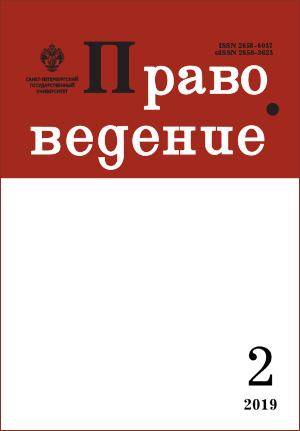The specifics of Chinese jurisprudence and its development at the present time
DOI:
https://doi.org/10.21638/spbu25.2019.208Abstract
The article deals with the development of the legal system of the People’s Republic of China at the present stage. Currently, China is undergoing judicial reform aimed at building democracy and the rule of law. This reform also has a significant impact upon the development of the economy and politics, as well as upon Chinese society as a whole. One of the most important concepts discussed within the framework of the new reform is the concept of the rule of law. This concept can be interpreted differently, however, the author considers the rule of law to be the official public-structural regulator of human behavior. Due to the presence of special historical and cultural reasons, the development of the Chinese state and law occurs along a special path with “Chinese characteristics”. Following the foundation of the PRC in 1949, the Soviet Union gained significant influence upon the development of the theory of state and law in China. Subsequently, in 1978, China launched a policy of reform and openness. After these significant events of the end of the 20th century, today’s globalization is another major factor which demonstrated a new stage in the development of Chinese law. The formation and development of the ideas of the rule of law in the PRC took place against the background and in the context of discussions about the relationship between modernization and the legal tradition of ancient Chinese law. The People’s Republic of China has a large territory which is populated by the representatives of 56 nationalities. They have their own special traditions and their own attitudes towards religion and culture. 70 years ago in China, it was almost impossible to ensure even a decent standard of living for such a multinational and large population and to satisfy all the basic needs of citizens. Therefore, the creation of a modern legal regime in the PRC is considered necessary, and at the same time a difficult task. Today, China, being a state with a rich history, has its own special legal tradition and a special direction of development along the path of Chinese communism.
Keywords:
Chinese law, jurisprudence, development, reform, globalization
Downloads
References
References
Chen, Jinzhao. 2018. Legal Interpretation of the Community of Human Destiny. Faxue luntan 1: 5–13. (In Chinese)
He, Qinhua. 2006. History of Chinese Law, vol. 1. Law Press. (In Chinese)
Li, Lin, Qi, Yanping. 2018. Looking Back and Looking Forward to the New Era of Chinese Jurisprudence. Faxue 6: 3–17. (In Chinese)
Li, Yongjun. 2018. Thinking Mode and Research Path of Contemporary Chinese Jurisprudence. Fazhi xiandai yanjiu 4: 18–27. (In Chinese)
Qian, Jilei. 2018. Chinese Jurisprudence towards the Age of Jurisprudence. Faxue pinglun 1: 26–41. (In Chinese)
Rybakov, Vyacheslav М. 2011. Complementarity of Tang Laws. Pis’mennye pamiatniki Vostoka 2 (15): 114–129. (In Russian)
Sang Benqian. 2006. The rule of law and its social resources. Xiandai faxue 1: 3–15. (In Chinese)
Tikhomirov, Iurii A. 2011. Legal state: models and reality. Zhurnal rossiiskogo prava 1: 5–20. (In Russian)
Zhang, Wenxian. 2017. Jurisprudence: The central theme of jurisprudence and the common concern of law. Qinghua faxue 4: 5–40. (In Chinese)
Zhang, Wenxian. 2017. Promoting Global Governance Reform, Building a New World: Order-Xi Jinping’s Global Thinking of Governing the Country and Governance. Huanqiu falv pinglun 4: 5–20. (In Chinese)
Downloads
Published
How to Cite
Issue
Section
License
Articles of "Pravovedenie" are open access distributed under the terms of the License Agreement with Saint Petersburg State University, which permits to the authors unrestricted distribution and self-archiving free of charge.




